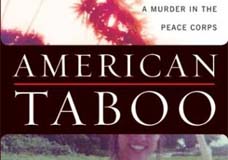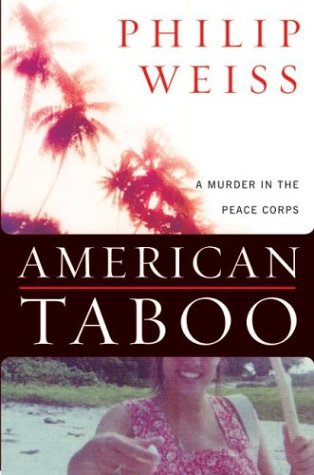June 1, 2004: Headlines: COS - Tonga: Crime: Murder: Safety and Security of Volunteers: ABQjournal: American Taboo : A Murder in the Peace Corps > Customer Reviews
Peace Corps Online:
Directory:
Tonga:
Special Report: 'American Taboo: A Murder in the Peace Corps':
June 1, 2004: Headlines: COS - Tonga: Crime: Murder: Safety and Security of Volunteers: ABQjournal: American Taboo : A Murder in the Peace Corps > Customer Reviews
American Taboo: A Murder in the Peace Corps
 | Charges possible in 1976 PCV slaying
Congressman Norm Dicks has asked the U.S. attorney in Seattle to consider pursuing charges against Dennis Priven, the man accused of killing Peace Corps Volunteer Deborah Gardner on the South Pacific island of Tonga 28 years ago. Background on this story here and here. |
 | American Taboo
Read the story of Volunteer Deborah Gardner's murder in Tonga in 1976 and how her killer has been free for the past 28 years with the help of the Peace Corps. Read an excerpt from Philip Weiss' book documenting the murder and coverup. Then read an essay by RPCV Bob Shaconis who says that Peace Corps' treatment as a "sacred cow" has exempted it from public scrutiny and that the agency has labored to preserve its shining reputation, sometimes at the expense of the very principles it is supposed to embody. |
American Taboo : A Murder in the Peace Corps > Customer Reviews

American Taboo : A Murder in the Peace Corps > Customer Reviews
Book Revisits Peace Corps Volunteer's Killing
By Tracy Dingmann
Journal Staff Writer
Peace Corps volunteer Deborah Gardner died a horrible, bloody death in the South Pacific island Kingdom of Tonga 28 years ago, and nobody seemed to care. A fellow Peace Corps volunteer named Dennis Priven was tried in Tonga in Gardner's death and shipped back to the United States, but was never held accountable in this country for the crime.
New York author Philip Weiss first heard of the Gardner killing 25 years ago during a backpacking trip through Polynesia. By then, the story of the beautiful girl and the mystery surrounding her killer had reached mythic proportions. Whatever the truth, the story haunted Weiss for years.
In March 2004 Weiss published "American Taboo," his investigation of the killing of Deborah Gardner and the failure of the American government to punish Priven for his acts on the night of Oct. 14, 1976.
The CBS news program "48 Hours" will examine the Gardner killing on Saturday, interviewing Weiss and many of the people involved in the story. The segment will air locally on KRQE-TV, Channel 13, at 9 p.m.
Watch "48 Hours" closely and you'll spot Albuquerque Journal staff writer Rick Nathanson. A Chicago native, Nathanson joined the Peace Corps in 1976 and was part of a group of volunteers that arrived on the island a few months after Gardner's group. Weiss interviewed Nathanson extensively for the book and published some of his personal photos.
"I interviewed a lot of people who were really close to this, but I feel Rick provided some much needed outside perspective," said Weiss this week.
"Few people have really examined this case with any substance, and Rick is one of those people."
Nathanson, then a 23-year-old reporter and editor for the weekly Tonga Chronicle, became the only reporter who covered the trial. The story spread well beyond the "Friendly Islands" because of dispatches Nathanson and his Tongan editor sent to their Associated Press contact in Australia.
The family of Gardner did not attend the trial and came to rely on those stories for everything they were to learn about the case.
The few articles that reached the mainland did so in the fall of 1976, when the election of Jimmy Carter was grabbing all the headlines. The killing of Gardner barely registered a blip on the news radaró which was just fine with officials at Peace Corps and the State Department.
"They washed their hands of it," said Nathanson, who still gets visibly irritated when talking about the killing, the trial and the subsequent revelations made public with Weiss' book.
Weiss' account of the 1976 Peace Corps killing on Tonga is shocking, not only for the gruesome details of the killing, but for the aftermath that allowed the killer to go free.
Priven, a brooding, burly volunteer from New York, was one of many men who had crushes on Gardner, a willful girl from the Northwest who didn't always conform to the strict rules governing single women on the tiny Christian island in Polynesia.
Gardner, however, wasn't interested in Priven as a suitor. In fact, she told friends, he was too intense and frightening.
One night Priven armed himself with a jagged diving knife and rode his bike to the hut where Gardner lived alone. Gardner's Tongan neighbors saw Priven wrestling with Gardner and made noises to scare him off. They saw Priven drop her bloody body in the doorway before pedaling off on his bike. Police later found Priven's eyeglasses in a pool of Gardner's blood on the floor.
It was the first killing in Tonga involving two people from the expatriate community, and one of few in the peaceful island kingdom.
At trial in Tonga, Priven was represented by a team of attorneys from Tonga and the United States. A psychiatrist was flown in from Hawaii to testify as an expert witnessó a "hired gun," according to Nathanson. The psychiatrist declared Priven schizophrenicó a word that has no equivalent in the Tongan language.
Tongan officials, mindful of the benefits of foreign aid, were wary of upsetting relations with the United States, which desperately wanted to downplay the whole affair. Tonga had the death penalty, but the Tongan government was loathe to impose it on an American, especially a Peace Corps volunteer.
The United States government provided virtually no advocacy for Gardner, who the defense portrayed as morally loose.
According to Weiss' book, the Tongan jury believed Priven killed Gardner but found him innocent by reason of insanity. The Peace Corps and the State Department, anxious for this distraction to quickly go away, wanted Priven back in the States. Tonga, which had no long-term treatment facilities for the criminally insane, wasn't keen to hold on to Priven, either. Still, they wanted and received written assurances that Priven would be committed to a mental hospital upon his return.
It didn't work out that way.
After his arrival in the United States, Priven was escorted to Sibley Memorial Hospital in Washington, D.C., by government officials. It was then they learned Priven could be admitted only through a voluntary commitment. Priven declined and walked away free, returning to his native New York City.
Before he left Sibley, though, he did agree to undergo a psychiatric evaluation that determined, contrary to the testimony given in Tonga, that Priven was not schizophrenic.
The whole mess could have been avoided, Nathanson insisted, if less urgency had been placed on getting Priven out of Tonga, and more on what to do with him once he returned to the United States.
"The myopic managers at Peace Corps in Washington, D.C., should have huddled with the prima donnas at the State Department to assemble a short list of attorneys with expertise in international law," Nathanson said. "They in turn could have reviewed the post-trial agreement to determine if it was enforceable; and if not, and if there was no way to make it enforceable, they still would have had time to figure out a Plan B."
Gardner's family kept quiet about the case for years, believing, as most people did, that Priven was being held in a mental hospital.
Priven, 50, worked for the Social Security Administration for more than two decades until his recent early retirement. He continues to live in Brooklyn, where few people know of his past.
For "American Taboo," Weiss tracked Priven down and interviewed him in a coffee bar in SoHo. Priven, however, spoke to Weiss only on the condition that his comments were "off the record," meaning Weiss could never write about them.
"I sent him a copy of my book, and it came back with a huge 'refused' sticker on it," Weiss said last week.
Priven refused to discuss the case with "48 Hours."
If there is a hero in this whole sordid tale, Nathanson said, it is Philip Weiss, who made public the full story and is forcing people to revisit this dishonorable episode in the history of the Peace Corps.
"No doubt it's little consolation to the family of Debbie Gardner," said Nathanson. "After all these years how are they to exact any measure of justice? How do these poor people ever get closure? The United States government lied by omission and hid this dirty little secret from them for the better part of three decades. It's absolutely outrageous and shameful, and I truly feel bad for the Gardner family."
"American Taboo: A Murder in the Peace Corps" by Philip Weiss
HarperCollins, 361 pp., $25.95
Get Copyright Clearance Copyright 2004 Albuquerque Journal
Commercial reprint permission
When this story was posted in November 2004, this was on the front page of PCOL:
 | The Birth of the Peace Corps
UMBC's Shriver Center and the Maryland Returned Volunteers hosted Scott Stossel, biographer of Sargent Shriver, who spoke on the Birth of the Peace Corps. This is the second annual Peace Corps History series - last year's speaker was Peace Corps Director Jack Vaughn. |
 | Charges possible in 1976 PCV slaying
Congressman Norm Dicks has asked the U.S. attorney in Seattle to consider pursuing charges against Dennis Priven, the man accused of killing Peace Corps Volunteer Deborah Gardner on the South Pacific island of Tonga 28 years ago. Background on this story here and here. |
 | Director Gaddi Vasquez: The PCOL Interview
PCOL sits down for an extended interview with Peace Corps Director Gaddi Vasquez. Read the entire interview from start to finish and we promise you will learn something about the Peace Corps you didn't know before.
Plus the debate continues over Safety and Security. |
Read the stories and leave your comments.

Some postings on Peace Corps Online are provided to the individual members of this group without permission of the copyright owner for the non-profit purposes of criticism, comment, education, scholarship, and research under the "Fair Use" provisions of U.S. Government copyright laws and they may not be distributed further without permission of the copyright owner. Peace Corps Online does not vouch for the accuracy of the content of the postings, which is the sole responsibility of the copyright holder.
Story Source: ABQjournal
This story has been posted in the following forums: : Headlines; COS - Tonga; Crime; Murder; Safety and Security of Volunteers
PCOL14868
13
.








